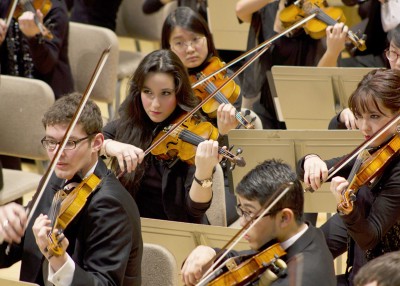
Boston Symphony Hall can seat more than 2,600 people and Friday, the Boston Philharmonic Youth Orchestra will fill it for the second time.
The first was last November, when the Free for All Concert Fund offered to fund a concert and give tickets away for free. Hundreds of people who had never had the opportunity to see the inside of Symphony Hall were able to enjoy the BPYO. It was so successful that the BPYO board decided to do something similar this time around, giving away around 1,000 donated tickets.
The program contains two of the most important pieces in classical music history: Beethoven’s Symphony No. 3 “Eroica” and Stravinsky’s “The Rite of Spring.”
“Each was composed at the beginning of a century by a composer at the age of 33,” said Benjamin Zander, conductor, music director and founder of The Boston Philharmonic Orchestra and the BPYO. “Each was to forge a completely new path for music for the ensuing hundred years.”
The pieces speak to the legacy of the orchestra as well. Zander, 76, began the BPYO in 2012 after conducting the Boston Philharmonic Orchestra for 37 years. He now operates both ensembles.
The BPYO has 112 members, ranging in age from 12 to 21, who come from all over the Boston area, according to its website. Zander explained the method behind this organization.
“We had an opportunity since [the BPYO] was started from scratch to really think out what kind of institution did we want,” he said.
The orchestra is tuition-free, as well as the tours the group goes on every summer. This helps ensure that the players are there because they want to be, without any hindrance, Zander said.
Despite being a world-renowned musician, conductor and speaker, Zander is able to devote himself to the BPYO and its members. Noël Theodosiou, BPO board director and chair of the marketing and audience development committee, was Zander’s student in high school and spoke of his skills as a conductor.
“He is an incredible story teller,” Theodosiou said. “He is really able to engage you in the music and understand what the composer is trying to say. And he is able to do that in a way that kind of gets the best out of you, a story that you can connect with.”
Nate Klause, a French horn player for the BPYO and a sophomore in Boston University’s College of Fine Arts, said classical music is “very much alive” in Zander’s life.
Zander works with the students in the BPYO in a way that nourishes their musical abilities as well as their life skills.
“I’m developing the capacity to think, the capacity to communicate, the capacity to write [and] take responsibility for the whole,” Zander said. “[I’m teaching them] to feel as though they are driving the operation and not just being passive people playing in the orchestra.”
The writing comes from a weekly practice within the orchestra called “white sheets.” Each member of the orchestra is given a piece of paper on their music stand and is able to write notes about the rehearsal or the piece and give then to Maestro Zander.
“I really like that he has his own opinions on the piece and that he consults with us before, and then we kind of go from there,” Klause said.
Zander added, “It’s all about building up power and spreading it around. I give a voice to every player.”
Some of the white sheets are published in every concert program to show off the analytical and passionate minds of the students.
“They get to be extraordinarily eloquent,” Zander said
One of the most extraordinary parts of the BPYO aside from the raw skill that each player possesses, Theodosiou said, is the community and love between the orchestra and Zander.
“They have a very special relationship,” Theodosiou said. “The philosophy of the youth orchestra is that it’s about music, but it’s also about leadership.”
Zander lives with a “life of possibility” and encourages those around him to do the same.
“I think that mostly the point of it all is … you just go out with the perspective that, you know, things are great or that things have possibility,” Klause said. “[You know] that there’s something further, something more than you would first notice, then things happen.”
Zander affects the lives of those in this orchestras deeply, connecting with them in a way that makes them feel extremely loved. The feeling is mutually beneficial, he said.
“I feel in a way more alive, more effective, more active than I ever have,” Zander said. “The vision for the Boston Philharmonic is passionate music-making without boundaries. That’s what we’re about.”
A previous version of this story said Benjamin Zander conducted the Boston Symphony Orchestra for 37 years rather than the Boston Philharmonic Orchestra. A previous version of this story said the BPYO is raffling off 1,000 donated tickets rather than giving away tickets. These corrections are reflected in the story above.





“Zander, 76, began the BPYO in 2012 after conducting the Boston Symphony Orchestra for 37 years.” This should, of course, be the Boston Philharmonic Orchestra, not the Boston Symphony Orchestra (which Ben Zander has never conducted).